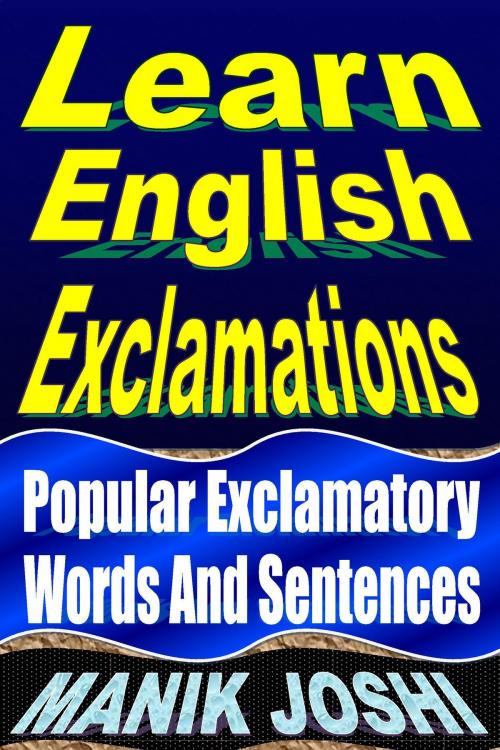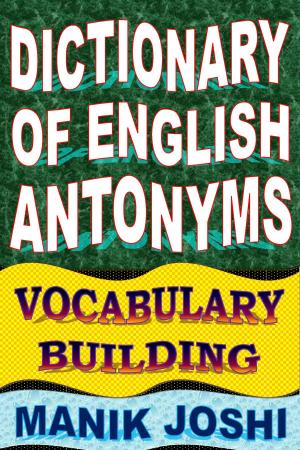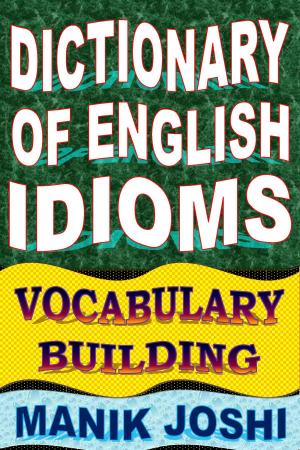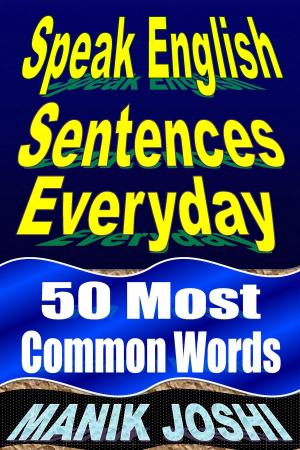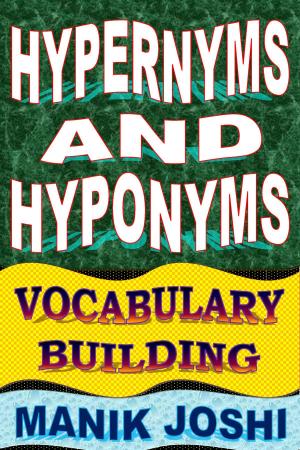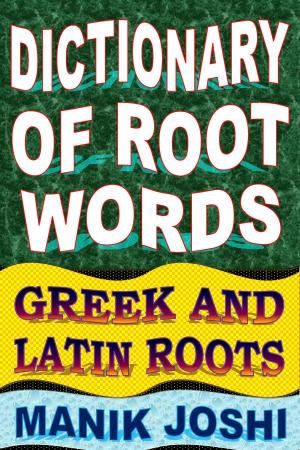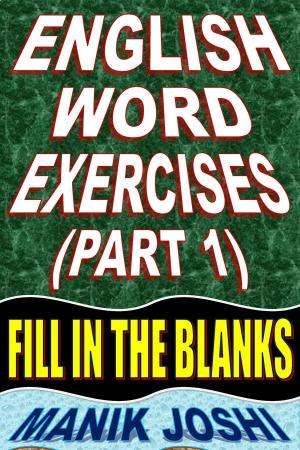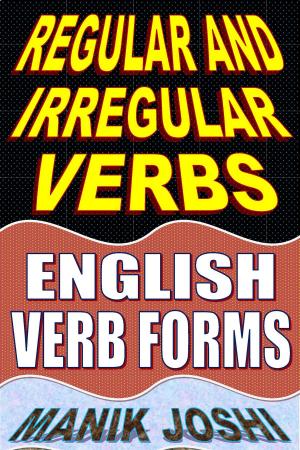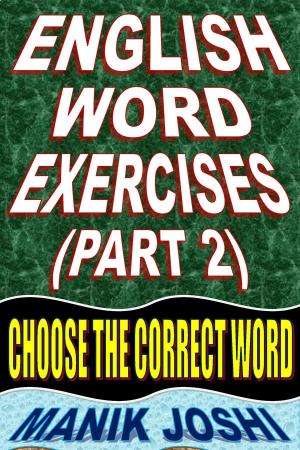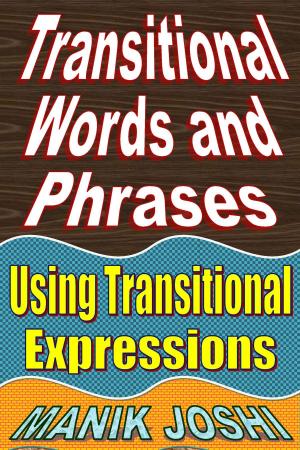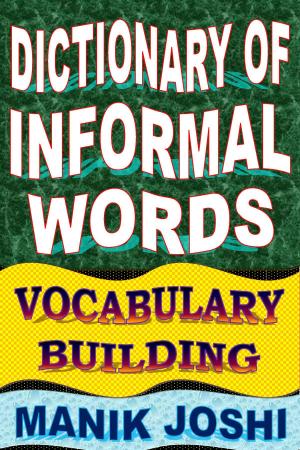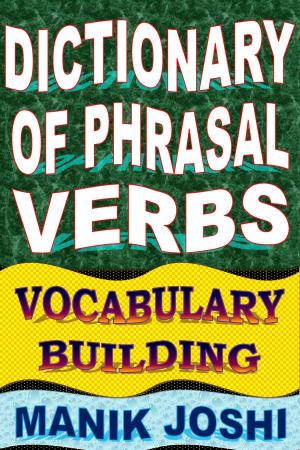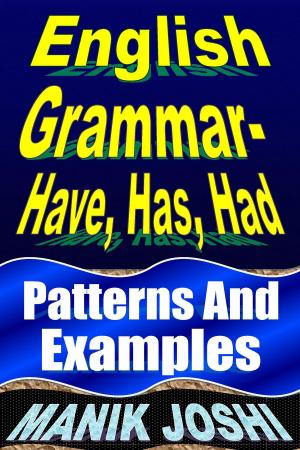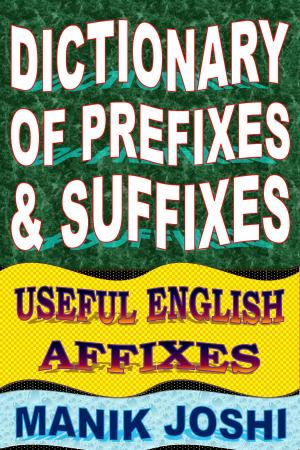Learn English Exclamations: Popular Exclamatory Words and Sentences
Nonfiction, Reference & Language, Education & Teaching, Teaching, Language Experience Approach, Study Aids, ESL, Foreign Languages| Author: | Manik Joshi | ISBN: | 9781301962983 |
| Publisher: | Manik Joshi | Publication: | June 19, 2013 |
| Imprint: | Smashwords Edition | Language: | English |
| Author: | Manik Joshi |
| ISBN: | 9781301962983 |
| Publisher: | Manik Joshi |
| Publication: | June 19, 2013 |
| Imprint: | Smashwords Edition |
| Language: | English |
This Book Covers The Following Topics:
- What is an “Exclamation”?
- Exclamatory Sentences
- Exclamatory Sentences with ‘What’
- Exclamatory Sentences with ‘How’
- Exclamatory Sentences with So and Such
- Exclamations in Declarative Sentences
- Exclamations in Interrogative Sentences
- Exclamations in Imperative Sentences
- Detailed List of Interjections
- Using ‘Common Words’ as Exclamations
- Useful Exclamatory Phrases/Sentences
- Other Patterns
- List of Emotions Shown by Exclamations
Exercise: 1
Exercise: 2
Sample This:
- What is an “Exclamation”?
DEFINITION: An exclamation (or interjection) is a short sound, word or phrase which is spoken suddenly to express strong emotion.
Or
Exclamatory words that can stand alone as a sentence while expressing emotions or reactions are called exclamations (or interjections).
Exclamation mark (!) should be written after an exclamation. “Exclamation Mark” is called "Exclamation Point" in American English.
There are many exclamatory words (interjections or exclamations) which are often used in daily life. Some of these words express one strong emotion while others express two or more strong emotions. They do not have a grammatical purpose in the sentence and are not associated to the other parts of the sentence. They do not play the role of a subject or a verb. They can stand by themselves, or are placed before, after or in middle of a sentence to express a strong emotion or feeling.
Examples:
Exclamatory Word -- Alas!
Represents feeling of ‘Sadness, Sorry’
Exclamatory Word -- Um!
Represents feeling of ‘Hesitation’
Exclamatory Word -- Yum!
Represents feeling of ‘Pleasant Taste or Smell’
You can use exclamations to show the following emotions:
admiration, affection, anger, annoyance, anticipation, apathy, approval, attention, awe, confusion, delight, despair, disappointment, disapproval, discontent, dislike, distress, eagerness, elation, enjoyment, excitement, fear, frustration, grief, happiness, humour, hurt, irritation, joy, love, mourning, pain, panic, pleasure, pride, remorse, respect, shame, shock, sorrow, sorry, surprise, sympathy, terror, wonder, etc.
IMPORTANT NOTES:
(1). Use Of An Exclamation (Interjection) In A Sentence
(a). Beginning A Sentence With An Interjection
When you begin a sentence with an interjection you can place either comma (,) or exclamatory mark (point) (!) after the interjection.
Examples:
Ah, what a wonderful gift!
Comma (,) after an interjection expresses less emotion.
Ah! What a wonderful gift!
Exclamatory mark (point) (!) after an interjection expresses more emotion.
Note: Both the sentences have exclamatory mark at the end.
Obviously, both are exclamatory sentences. But second one is more emphatic. Also note: if you put comma after an interjection then next word in the sentence will begin from small letter but if you put exclamatory mark after an interjection then next word in the sentence will begin from capital letter.
Important Note: You can also end the sentence with period (.) or question mark (?) to show mild emotion.
Ah, what a wonderful gift.
Ah! What a wonderful gift.
Wow, We won.
Oh, did you go there?
(B). Use Of An Interjection In The Middle Of A Sentence
Examples:
Hundreds of people, alas, feared killed in a massive landslide.
Albert Einstein was born in...er…Germany.
You deleted my folder…um…my file!
(C). Use Of An Interjection At The End Of A Sentence
Example:
So got married, huh!
What do you think of me, eh?
This Book Covers The Following Topics:
- What is an “Exclamation”?
- Exclamatory Sentences
- Exclamatory Sentences with ‘What’
- Exclamatory Sentences with ‘How’
- Exclamatory Sentences with So and Such
- Exclamations in Declarative Sentences
- Exclamations in Interrogative Sentences
- Exclamations in Imperative Sentences
- Detailed List of Interjections
- Using ‘Common Words’ as Exclamations
- Useful Exclamatory Phrases/Sentences
- Other Patterns
- List of Emotions Shown by Exclamations
Exercise: 1
Exercise: 2
Sample This:
- What is an “Exclamation”?
DEFINITION: An exclamation (or interjection) is a short sound, word or phrase which is spoken suddenly to express strong emotion.
Or
Exclamatory words that can stand alone as a sentence while expressing emotions or reactions are called exclamations (or interjections).
Exclamation mark (!) should be written after an exclamation. “Exclamation Mark” is called "Exclamation Point" in American English.
There are many exclamatory words (interjections or exclamations) which are often used in daily life. Some of these words express one strong emotion while others express two or more strong emotions. They do not have a grammatical purpose in the sentence and are not associated to the other parts of the sentence. They do not play the role of a subject or a verb. They can stand by themselves, or are placed before, after or in middle of a sentence to express a strong emotion or feeling.
Examples:
Exclamatory Word -- Alas!
Represents feeling of ‘Sadness, Sorry’
Exclamatory Word -- Um!
Represents feeling of ‘Hesitation’
Exclamatory Word -- Yum!
Represents feeling of ‘Pleasant Taste or Smell’
You can use exclamations to show the following emotions:
admiration, affection, anger, annoyance, anticipation, apathy, approval, attention, awe, confusion, delight, despair, disappointment, disapproval, discontent, dislike, distress, eagerness, elation, enjoyment, excitement, fear, frustration, grief, happiness, humour, hurt, irritation, joy, love, mourning, pain, panic, pleasure, pride, remorse, respect, shame, shock, sorrow, sorry, surprise, sympathy, terror, wonder, etc.
IMPORTANT NOTES:
(1). Use Of An Exclamation (Interjection) In A Sentence
(a). Beginning A Sentence With An Interjection
When you begin a sentence with an interjection you can place either comma (,) or exclamatory mark (point) (!) after the interjection.
Examples:
Ah, what a wonderful gift!
Comma (,) after an interjection expresses less emotion.
Ah! What a wonderful gift!
Exclamatory mark (point) (!) after an interjection expresses more emotion.
Note: Both the sentences have exclamatory mark at the end.
Obviously, both are exclamatory sentences. But second one is more emphatic. Also note: if you put comma after an interjection then next word in the sentence will begin from small letter but if you put exclamatory mark after an interjection then next word in the sentence will begin from capital letter.
Important Note: You can also end the sentence with period (.) or question mark (?) to show mild emotion.
Ah, what a wonderful gift.
Ah! What a wonderful gift.
Wow, We won.
Oh, did you go there?
(B). Use Of An Interjection In The Middle Of A Sentence
Examples:
Hundreds of people, alas, feared killed in a massive landslide.
Albert Einstein was born in...er…Germany.
You deleted my folder…um…my file!
(C). Use Of An Interjection At The End Of A Sentence
Example:
So got married, huh!
What do you think of me, eh?
